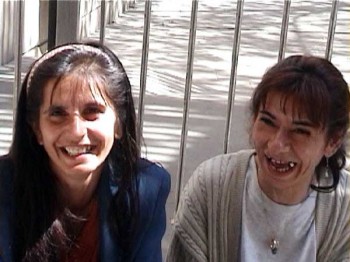
On the heels of the Louvre pickpocket debacle, here’s a profile of two exuberant Roma women pickpocket beggars who tell us how they do it, who their favorite victims are, and why. They also told us how they accomplish a quick-change on the run after a theft: “I take out my ponytail,” Gemila said, “and put on lipstick.”
In Chapter One of my book, I describe how Maritza and Ravenna, children in Rome, pretend to beg under a sheet of newspaper. In Barcelona, Nezira and Gamila carry big slabs of cardboard, roughly torn from a carton. On it, scrawled in Spanish, is “No work. No money. No eat. Thank you for some money.”
The women, 31 and 28 years old, shove the cardboard horizontally into the waist area of their target and look up with enormous eyes. Under the cardboard their nimble fingers open fanny packs and rummage through pockets, unseen by their owners.
“These two are this city’s most prolific pickpocket pair,” Police officer Giorgio Pontetti told us when he sat in on our interview of them.
How is one to know desperation from deception, mendicants from impostors? One begs to eat, another begs to steal. The impostors, those who steal under the pretense of begging, can be found all across southern Europe. Some attempt to tug at heartstrings with scribbled claims of being refugees, and perhaps they are. Others have given up pretenses altogether, keeping the cardboard but omitting the written request for money. For them, any prop will do: a map, a section of old newspaper, an infant.
Yes, even an infant. A sleepy baby in a sling on the chest well communicates hunger and need. And if the woman with the baby comes close enough, the baby will act as a shield for her hands. It’s not uncommon for these babies to be in the midst of nursing at their mothers’ bare breast: all the more distracting to the victim. Irreverent? Perhaps. Deceitful? Absolutely.
Finally, it is frequently claimed that these women will sometimes toss their babies at their victims, which distracts the victims to an extreme and occupies their hands at the same time. Although we’ve heard it said many times, we cannot substantiate the assertion.
Pickpocket beggars
Beggar-thieves Nezira and Gamila had it all figured out. They had plopped their slender bodies into childlike positions on the ground, cross-legged, and dropped their jackets into a heap beside them. They were both pretty, with long dark hair and teenage faces. They squirmed restlessly, fidgeted, and repeatedly glanced up to Officer Pontetti for encouragement and approval.

“I go up to people,” Gamila explained. “If they say go away because they know I am going to steal from them, we just go away.” She shook her bangs out of her eyes. “But if they seem to be innocent, then I will go for them. They have no idea that I’m a bad person and want to steal money.”

Gamila grinned, hideously transforming her pretty face into a week-old jack-o’lantern’s as she revealed her rotten teeth. She lit a cigarette.
“Japanese are hardest to steal from because they always throw up their hands and step aside,” Nezira said. “They don’t want to have anything to do with us, so it’s hard to get close. They don’t want to get involved.”

“Germans are so-so. Americans are difficult, but they have so many dollars!” Gamila laughed with embarrassment at her own daring, dipped her head, and looked at Nezira. Nezira giggled, then both fell apart, as if they couldn’t maintain seriousness for more than a few minutes at a time.

They’re serious on the job, though. Bob used a lipstick camera which, as its name implies is the size of a lipstick, to film a similar duo. We put money-sized cut paper into an envelope, put the envelope in a fanny pack, and zipped the pouch closed. Bob wore it. Soon enough, a pair of women approached us making kissing faces, an odd combination of worried eyebrows, pursed lips, and pleading eyes. One’s cupped, begging hand steadied the cardboard balanced on her other arm. Bob held his little wide-angle lens at hip height. Under the cardboard, the film showed, the beggar-thief opened the fanny pack, removed the envelope, and closed the zipper. With a final mimed kiss and the envelope hidden beneath their cardboard, the pair wandered away.
Rich man, poor man, beggar man, thief. Was this M.O. used in the mid-1700s when the Mother Goose rhyme was written? Perhaps it was originally “beggar man-thief.”
When the two women saw us again half an hour later, they gave us the finger.
Excerpt from Travel Advisory: How to Avoid Thefts, Cons, and Street Scams
Chapter Five: Rip Offs: Introducing…The Opportunist







1 Comment
I guess that, if someone becomes a pickpocket, it has to do with poverty for some and greed for others. But no matter what, they are making a lot people crying/sad.